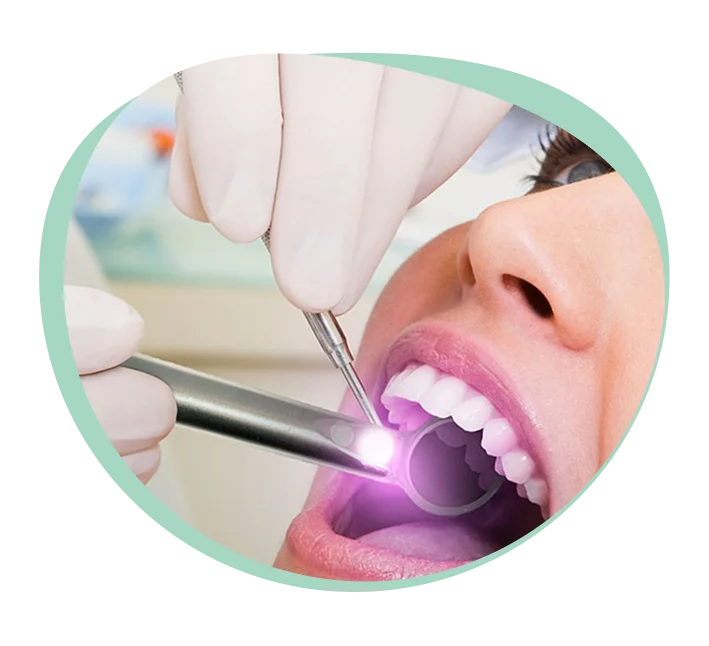Difficulty Chewing or Swallowing Can Be a Sign of Oral Cancer
Our Expert DENTAL CANCER SCREENING and MANAGEMENT Ensures Early Detection & Effective Treatment!

What is Dental Cancer Screening?
Dental cancer screening is a preventive check-up that helps detect early signs of oral cancer, including abnormalities in the lips, tongue, gums, and other oral tissues. Early detection significantly improves treatment success rates and reduces complications.
Who Should Get a Dental Cancer Screening?
Dental cancer screening is essential for individuals at higher risk of oral cancer. You should consider a screening if you fall into any of these categories:
Individuals aged 40+
The risk of oral cancer increases with age.
Tobacco and alcohol users
Smoking, chewing tobacco, and excessive alcohol consumption significantly raise the risk.
Patients with a history of oral cancer
Those previously diagnosed with oral cancer need regular check-ups for early detection of recurrence.
People with persistent mouth issues
Unexplained sores, pain, lumps, or red/white patches in the mouth may be early warning signs.
HPV-positive individuals
The Human Papillomavirus (HPV) has been linked to certain types of oral cancer.
Individuals with prolonged sun exposure
This can lead to lip cancer, especially in outdoor workers.
People with a weak immune system
Individuals with compromised immunity (e.g., due to medical conditions or medications) may be at higher risk.
Common Symptoms of Oral Cancer
Oral cancer can manifest in various ways. If you experience any of the following symptoms persisting for more than two weeks, it’s essential to seek a professional evaluation:
- Persistent Mouth Sores – Ulcers or sores in the mouth that do not heal.
- Red or White Patches – Unexplained red (erythroplakia) or white (leukoplakia) patches on the tongue, gums, or inner cheeks.
- Unexplained Pain or Numbness – Ongoing pain, tenderness, or numbness in the mouth or lips.
- Lumps or Thickened Areas – Unusual growths, lumps, or thickening of oral tissues.
- Difficulty Chewing or Swallowing – A feeling of obstruction in the throat or pain while eating.
- Chronic Sore Throat or Hoarseness – Persistent throat irritation or voice changes.
- Unexplained Bleeding – Bleeding in the mouth without any obvious cause.
- Loose Teeth or Poorly Fitting Dentures – Unexpected changes in how teeth or dentures fit.
- Ear Pain Without Infection – Persistent ear pain, often on one side, can be a sign of oral cancer.
How is Dental Cancer Screening Done at Our Clinic in Jubilee Hills?
Dental cancer screening is a quick, painless procedure that helps detect early signs of oral cancer. Here’s what to expect during the screening process:
1. Visual Examination
The dentist or oral specialist carefully inspects your mouth, lips, tongue, gums, cheeks, throat, and the roof and floor of the mouth for:
- Unusual sores, red or white patches
- Swelling, lumps, or rough spots
- Asymmetry or tissue abnormalities
2. Physical Palpation
The specialist gently feels the tissues inside the mouth, jaw, and neck to detect any lumps, hardness, or swelling that might indicate abnormal growth.
3. Fluorescence & Dye Tests
- Special Lights or Dyes (like Toluidine Blue or VELscope) may be used to highlight abnormal tissue.
- Oral Cytology Test: Cells are collected with a brush and examined under a microscope for abnormalities.
4. Biopsy (If Needed)
If suspicious tissues are found, a biopsy may be performed. A small sample of the tissue is taken and analyzed in a lab to confirm or rule out cancer.
5. Imaging Tests (For Advanced Diagnosis)
If further evaluation is needed, the doctor may recommend:
- X-rays – To check if cancer has spread to the jaw.
- CT Scan or MRI – To assess tumour size and location.
- PET Scan – To detect cancer spread beyond the mouth.
How Long Does the Screening Take?
A routine dental cancer screening takes 5-10 minutes. If a biopsy or imaging is needed, additional time and follow-up visits may be required.
Management and Treatment of Oral Cancer
Early detection of oral cancer significantly improves the chances of successful treatment. The management and treatment options depend on the stage, location, and type of cancer, as well as the patient’s overall health. Here’s how oral cancer is treated:
1. Surgery
If oral cancer is detected in its early stages, surgical removal of the tumour may be the primary treatment option. Procedures include:
- Tumor Resection – The cancerous tissue is surgically removed along with a margin of healthy tissue.
- Reconstructive Surgery – If large portions of tissue are removed, reconstructive procedures may be done to restore appearance and function.
2. Radiation Therapy
High-energy radiation is used to destroy cancer cells or shrink tumours before surgery.
- Often recommended for early-stage cancer or post-surgery to kill remaining cancer cells.
- Helps preserve function in cases where surgery isn’t viable.
- Side effects: Dry mouth, sore throat, difficulty swallowing.
3. Chemotherapy
Chemotherapy involves using powerful drugs to kill cancer cells. It is usually combined with radiation therapy for advanced cases.
- Suitable for cancers that have spread beyond the oral cavity.
- Can be administered orally or intravenously.
- Side effects: Fatigue, nausea, hair loss, lowered immunity.
4. Targeted Therapy
This modern treatment specifically attacks cancer cells while minimizing damage to healthy tissues
- EGFR Inhibitors block the signals that help cancer cells grow.
- Fewer side effects compared to chemotherapy.
- Often used in cases of recurrent or metastatic cancer.
5. Immunotherapy
For patients with advanced oral cancer, immunotherapy helps boost the body’s immune system to recognize and attack cancer cells.
- Used when traditional treatments are not effective.
- Works by blocking proteins that stop immune cells from attacking cancer.
6. Palliative Care & Rehabilitation
For advanced cases, palliative care improves quality of life by managing pain, swallowing difficulties, and emotional well-being.
- Speech therapy if speech is affected
- Nutritional guidance to ensure proper diet intake
- Psychological support to help patients cope emotionally.
7. Prosthetic Rehabilitation
- Maxillofacial Prosthetics – Restores missing palate and jawbone for improved speech and chewing.
- Facial Prosthetics – Custom ear, eye, and nose replacements for functional and aesthetic recovery.
- Enhanced Quality of Life – Restores confidence, social interaction, and daily function.
Which Treatment is Right for You?
The best treatment plan depends on:
- Cancer stage and severity
- Overall health and patient preference
- Need for functional and cosmetic restoration
Early diagnosis is crucial for effective management. Regular dental cancer screenings and lifestyle changes (like quitting smoking and limiting alcohol) can reduce the risk.

Why Choose Us for Dental Cancer Screening and Management?
When it comes to oral cancer detection and treatment, choosing the right healthcare provider is crucial. Here’s why we stand out:
Experienced Dental Specialists
Our team consists of highly trained dentists and oral surgeons specializing in early detection and treatment of oral cancer.
Advanced Diagnostic Equipment for Early Detection
We use the latest screening tools, fluorescence technology, and biopsy techniques to detect cancer at the earliest stage, ensuring better treatment outcomes.
Personalized Treatment Plans
Every patient is unique. We tailor our treatment approach based on the type, stage, and severity of the cancer, considering your overall health and lifestyle.
Comprehensive Multidisciplinary Care
Our integrated approach combines dentistry, oncology, reconstructive surgery, and rehabilitation to provide seamless care under one roof.
Minimally Invasive & Advanced Treatment Options
We offer cutting-edge treatments like targeted therapy, immunotherapy, and laser surgeries, reducing recovery time and side effects.
Compassionate Care & Post-Treatment Support
Beyond treatment, we provide speech therapy, dietary counselling, pain management, and emotional support to help you regain quality of life.
Focus on Prevention & Education
We emphasize awareness, lifestyle modifications, and regular screenings to prevent cancer recurrence and improve long-term health.
